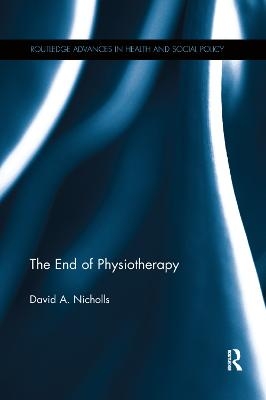
The End of Physiotherapy
Seiten
2019
Routledge (Verlag)
978-0-367-22451-6 (ISBN)
Routledge (Verlag)
978-0-367-22451-6 (ISBN)
Physiotherapy needs to engage in critically informed theoretical discussion about the profession's history to explore practice from economic, philosophical, political and sociological perspectives. This book aims to explain how physiotherapy has arrived at a critical point in its history, and to point to a new future for the profession.
Physiotherapy is arriving at a critical point in its history. Since World War I, physiotherapy has been one of the largest allied health professions and the established provider of orthodox physical rehabilitation. But ageing populations of increasingly chronically ill people, a growing scepticism towards biomedicine and the changing economy of healthcare threaten physiotherapy’s long-held status. Paradoxically, physiotherapy’s affinity for treating the ‘body-as-machine’ has resulted in an almost complete inability to identify the roots of the profession’s present problems, or define possible ways forward. Physiotherapists need to engage in critically informed theoretical discussion about the profession’s past, present and future - to explore their practice from economic, philosophical, political and sociological perspectives.
The End of Physiotherapy aims to explain how physiotherapy has arrived at this critical point in its history, and to point to a new future for the profession. The book draws on critical analyses of the historical and social conditions that have made present-day physiotherapy possible. Nicholls examines some of the key discourses that have had a positive impact on the profession in the past, but now threaten to derail it. This book makes it possible for physiotherapists to think otherwise about their profession and their day-to-day practice. It will be essential reading for scholars and students of physiotherapy, interprofessional and community rehabilitation, as well as appealing to those working in medical sociology, the medical humanities, medical history and health care policy.
Physiotherapy is arriving at a critical point in its history. Since World War I, physiotherapy has been one of the largest allied health professions and the established provider of orthodox physical rehabilitation. But ageing populations of increasingly chronically ill people, a growing scepticism towards biomedicine and the changing economy of healthcare threaten physiotherapy’s long-held status. Paradoxically, physiotherapy’s affinity for treating the ‘body-as-machine’ has resulted in an almost complete inability to identify the roots of the profession’s present problems, or define possible ways forward. Physiotherapists need to engage in critically informed theoretical discussion about the profession’s past, present and future - to explore their practice from economic, philosophical, political and sociological perspectives.
The End of Physiotherapy aims to explain how physiotherapy has arrived at this critical point in its history, and to point to a new future for the profession. The book draws on critical analyses of the historical and social conditions that have made present-day physiotherapy possible. Nicholls examines some of the key discourses that have had a positive impact on the profession in the past, but now threaten to derail it. This book makes it possible for physiotherapists to think otherwise about their profession and their day-to-day practice. It will be essential reading for scholars and students of physiotherapy, interprofessional and community rehabilitation, as well as appealing to those working in medical sociology, the medical humanities, medical history and health care policy.
David A. Nicholls is Associate Professor in the School of Clinical Sciences, Auckland University of Technology, New Zealand.
PART I 1 Introduction; 2 Physical therapies before 1894; 3 The quest for legitimacy (1894–1914); 4 The pursuit of orthodoxy (1914–1973); 5 Physiotherapy under neoliberalism (1973–present); PART II; 6 The body; 7 Posture and movement; 8 Function and rehabilitation; PART III; 9 Implications for education, practice, regulation and research; 10 The end of physiotherapy; Epilogue: Methodology.
| Erscheinungsdatum | 15.05.2019 |
|---|---|
| Reihe/Serie | Routledge Advances in Health and Social Policy |
| Verlagsort | London |
| Sprache | englisch |
| Maße | 156 x 234 mm |
| Gewicht | 439 g |
| Themenwelt | Medizin / Pharmazie ► Physiotherapie / Ergotherapie ► Rehabilitation |
| Studium ► Querschnittsbereiche ► Prävention / Gesundheitsförderung | |
| ISBN-10 | 0-367-22451-8 / 0367224518 |
| ISBN-13 | 978-0-367-22451-6 / 9780367224516 |
| Zustand | Neuware |
| Informationen gemäß Produktsicherheitsverordnung (GPSR) | |
| Haben Sie eine Frage zum Produkt? |
Mehr entdecken
aus dem Bereich
aus dem Bereich
das Manual zur psychologischen Gesundheitsförderung
Buch | Hardcover (2023)
Springer Berlin (Verlag)
39,99 €
Wissenschaftlich basierte Empfehlungen, Tipps und Ernährungspläne für …
Buch (2022)
Thieme (Verlag)
51,00 €


